
by Nancy Jaffer | Jun 22, 2022
The U.S. will be hosting the Longines FEI World Cup finals twice in the next four years, with the Split Rock Jumping Tour’s Fort. Worth, Texas, venue just announced as the site of the show jumping and dressage competition, three years after Omaha’s scheduled 2023 encore of that city’s 2017 Cup finals debut.

Fort Worth will offer a venue like no other for the Longines FEI World Cup finals.
It’s quite a coup for Split Rock, which is only in its eighth year.
“We don’t like to sit still,” explained Derek Braun, Split Rock’s president and founder.
“It’s always been a big dream of mine to organize a championship.”
When the tour readied its inaugural 4-star show jumping qualifier slated for the Will Rogers Coliseum, “It was in our head as potential.”
But as was the case with so many plans, Covid threw a wrench into the picture when Split Rock’s first Fort Worth show had to be cancelled in 2020.
“That left us in a real bind because we wanted to operate an event there before making the decision to bid it,” said Derek.
But 2021 offered an opportunity and the Split Rock crew grabbed it.

Conor Swail was the winner of the inaugural Fort Worth World Cup qualifier. (c) Winslow Photography
“Last year, because Fort Worth was so incredibly successful for everyone and the feedback was so amazing,” the team decided to push for the finals.
“We only had six weeks to put together the bid from the time that our event went,” Derek recounted.
“We all put our heads down and made it happen and had an amazing presentation with FEI. I guess we did a good enough job to give them the confidence to give it to us.”
Although Split Rock has never put on a dressage show, he said “we will absolutely bring people that can help us with those details to accomplish only the best.”
The city of Fort. Worth, which is a partner in the effort with Split Rock, will be the seventh U.S. location to hold a World Cup finals. Others were Baltimore, Tampa, Del Mar, Los Angeles (dressage only) Las Vegas (five times) and Omaha. Vegas was supposed to have the finals again in 2020, but it also was a casualty of Covid and did not bid again.
Fort Worth’s finals presents a nice step forward in terms of building a spectator base for major international jumping and dressage competitions in parts of the country other than the East and West coasts. Lisa Roskens, who spearheaded the Omaha finals presented through the Omaha Equestrian Foundation, noted, “When we pitched for 2017, we said our goal was not just to host a great Finals, but to inspire others to do so as well and to expand the reach of the FEI in the central part of the country.”
Lisa also complimented Erin Davis-Heineking, who approached Split Rock with the concept of having an annual jumper show in Fort Worth.
“She is a true talent in and out of the saddle,” Lisa observed.
Derek and his associates plan to be in Omaha for its finals next year.
“I have huge respect for what they were able to do in 2017 and obviously going to do next year. I plan on utilizing some of the team they have put together for their event. I have not spoken to them yet, but I hope they are willing to give us all and any advice possible, because they did such a great job.”
Vaulting, which will be one of the features at Omaha for the first time, may be a possibility in Fort Worth, Derek said, but it’s still early days in terms of making that decision.
Entertainment–always a big part of the finals–will have a western theme, naturally, considering the location.
“The western culture there is like nothing else, and we plan to have everybody who comes to town experience all the culture Fort Worth has to offer; the nightlife, the shopping. The atmosphere just draws everyone in, Everyone is going to be able to make a vacation weekend of it for sure,” said Derek.
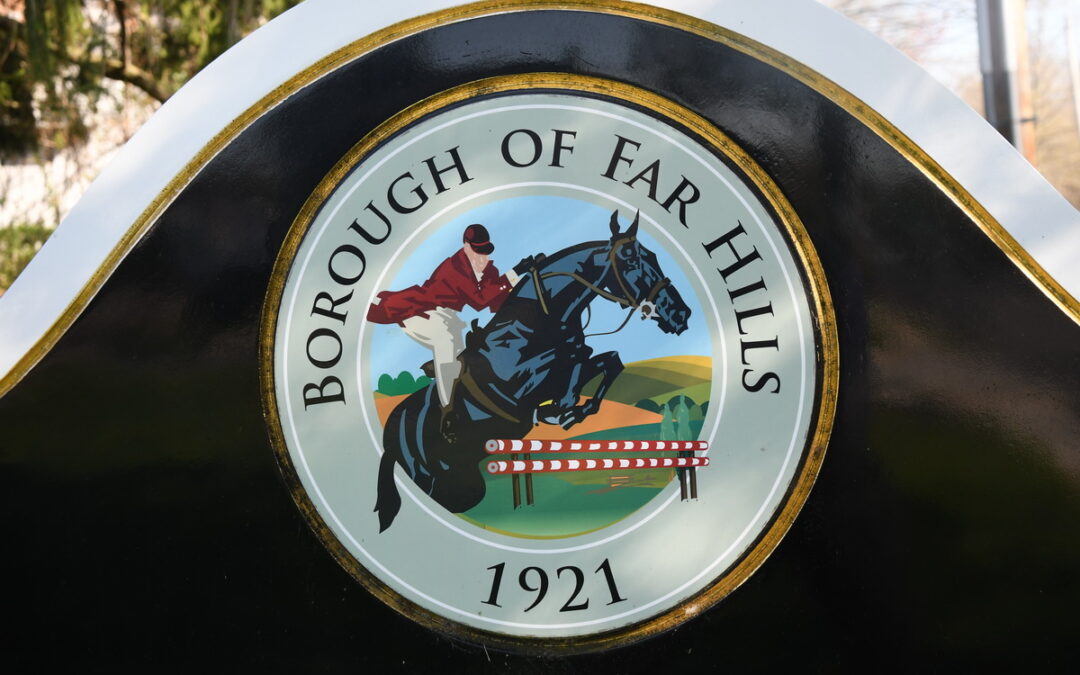
by Nancy Jaffer | Jun 28, 2022
You’ve got to love a town where the official seal bears the image of a show jumper, neatly clearing a vertical obstacle of red and white rails. That municipality is Far Hills, N.J., which has quite a history with horses.
The name Far Hills has long been linked with an equestrian lifestyle, as part of the greater Somerset Hills area that includes the U.S. Equestrian Team Foundation’s Gladstone facility and the Essex Foxhounds’ home in Peapack.
Although it is less than five square miles, Far Hills may ring a bell with you because it is the home of the Far Hills Race Meeting, which each autumn draws as many as 30,000 visitors (about 30 times the number of its residents) and more recently, the site of the revived Essex Horse Trials (essexhorsetrials.org), scheduled for this coming weekend..
Matthias Hollberg, who competed at the Essex Horse Trials last year, will be back this weekend. (Photo © 2021 by Lawrence J. Nagy)Although it is less than five square miles, Far Hills may ring a bell with you because it is the home of the Far Hills Race Meeting, which each autumn draws as many as 30,000 visitors (about 30 times the number of its residents) and more recently, the site of the revived Essex Horse Trials (essexhorsetrials.org), scheduled for this coming weekend.

The Far Hills steeplechase calls Moorland Farm home (Photo © by Nancy Jaffer)
Both take place on a former estate, Moorland Farm. This year, however, the dressage and show jumping portions of Essex will run on Friday, July 1, a few miles down the road at the USET Foundation, while the cross-country will be held the following day over the varied terrain at Moorland.
Tickets are $10 per carload each day, and if you’re unfamiliar with this corner of the state, it’s the perfect occasion to visit. There are plenty of vendors and in addition, a car show at Moorland for those who want something to do besides watching the horses.
Competitors in the featured Open Preliminary division, which offers $10,000 in prize money, include local stars Meg Kepferle of Long Valley, N.J., on Cooley Renegade and Arielle Aharoni of Bedminster, N.J., with Furst Queen and Littlebitadominic, as well as Chumley. That’s the hunting horse owned by dressage rider Alice Tarjan of Oldwick, who contributed to the Dutta U.S. Dressage Team’s second-place finish in Rotterdam last weekend. (Read about it in the second feature on this website.)
Also entered is Hannah Sue Burnett, winner of the division last year. This time, she’s riding Stakkato Bronx, and her new husband, Matthias Hollberg, will be on J. Both horses are owned by Jacqueline Mars, a great benefactor of the sport. Sarah Kozumplik-Murphy, two-time winner of the Devon eventing derby, will be aboard Devil Munchkin.
There won’t be any horses going over the striped colored poles as depicted in the Far Hills logo during the Moorland portion of the competition, however, since the segments using that equipment will be at the Team. But the logo is still an appropriate image to associate with both the town and the races as they pass their century milestones.
The steeplechase marked its 100th anniversary in 2021, when the borough of Far Hills did the same, though the steeplechase was actually100 in 2020 but precluded from celebrating that year when it was cancelled due to Covid.
Eminent historian Barry Thomson, appearing at the Clarence Dillon library in Bedminster recently, gave a lecture about Far Hills’ history, quoting a 1986 article in Town & Country magazine that cited the borough’s “patrician style.”
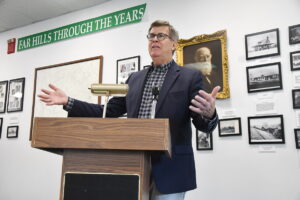
Historian Barry Thomson is an expert on the history of the Somerset Hills. (Photo © 20022 by Lawrence J. Nagy)
The piece described Far Hills this way: “Tucked away in leafy western New Jersey is a horsey enclave with a distinctly blueblood character all its own. Since the 1890s, fashionable New Yorkers and ardent foxhunters have been drawn to its rolling hills and verdant meadows.”
As Barry noted, “That’s not all of what Far Hills is about, but it’s certainly a big part of what Far Hills is about and has been for a long time.”
Horse-drawn carriages would line up at the Far Hills train station at the end of the 19th Century and beginning of the 20th, as business leaders arrived from New York each weekend and in the summers to enjoy the countryside in a special part of the state.
By 1921, rising taxes had led the 200 residents of Far Hills to separate from Bernards Township and incorporate as a borough. The local property tax rate jumped from $2.72 in 1919 to $3.53 in 1920. (Those were the days!)
Both the villagers and Far Hills estate owners objected to sharing the costs of road upkeep in the 60-square-mile township with its population of 5,100 and also to the school taxes for educating the township’s 800 children, of whom only 90 were from Far Hills. And that led to formation of the borough.
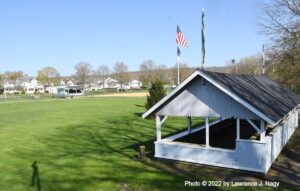
The Far Hills fairgrounds. (Photo © 2022 by Lawrence J. Nagy)
The fairgrounds in Far Hills, now probably best known as the venue for the Visiting Nurse Association of the Somerset Hills’ spring and fall rummage sales, once hosted many horse and livestock shows. The little grandstand from those days is still on site.
Oh, and one more thing about the Far Hills borough seal. No way of knowing for sure if its show jumper is unique among municipalities across the country, but it should be noted that Wellington, Fla., home of the Winter Equestrian Festival, merely has a horse’s head on its logo–despite the fact that it draws thousands of horses from around the world for its shows.
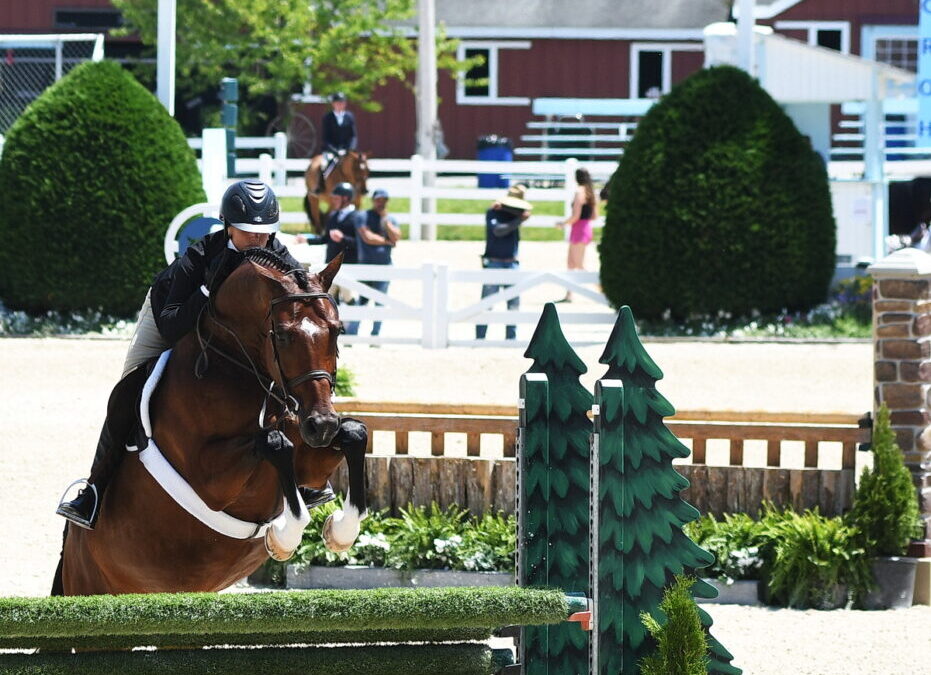
by Nancy Jaffer | Jun 18, 2022
Pat Boyle and Phil De Vita Jr., two horse show managers who have experience with competitions across the country, will “put a fresh set of eyes” on the Devon Horse Show as they take the helm for the 2023 edition.
The two were just appointed following the resignation of the men who ran the Pennsylvania multi-breed fixture for decades. David Distler and Peter Doubleday had a total of 85 years between them at the U.S. Equestrian Federation Heritage Show when they stepped down on June 6.
Those in the legions of Devon devotees who might worry about big modifications to the icon should rest easy, according to Pat.
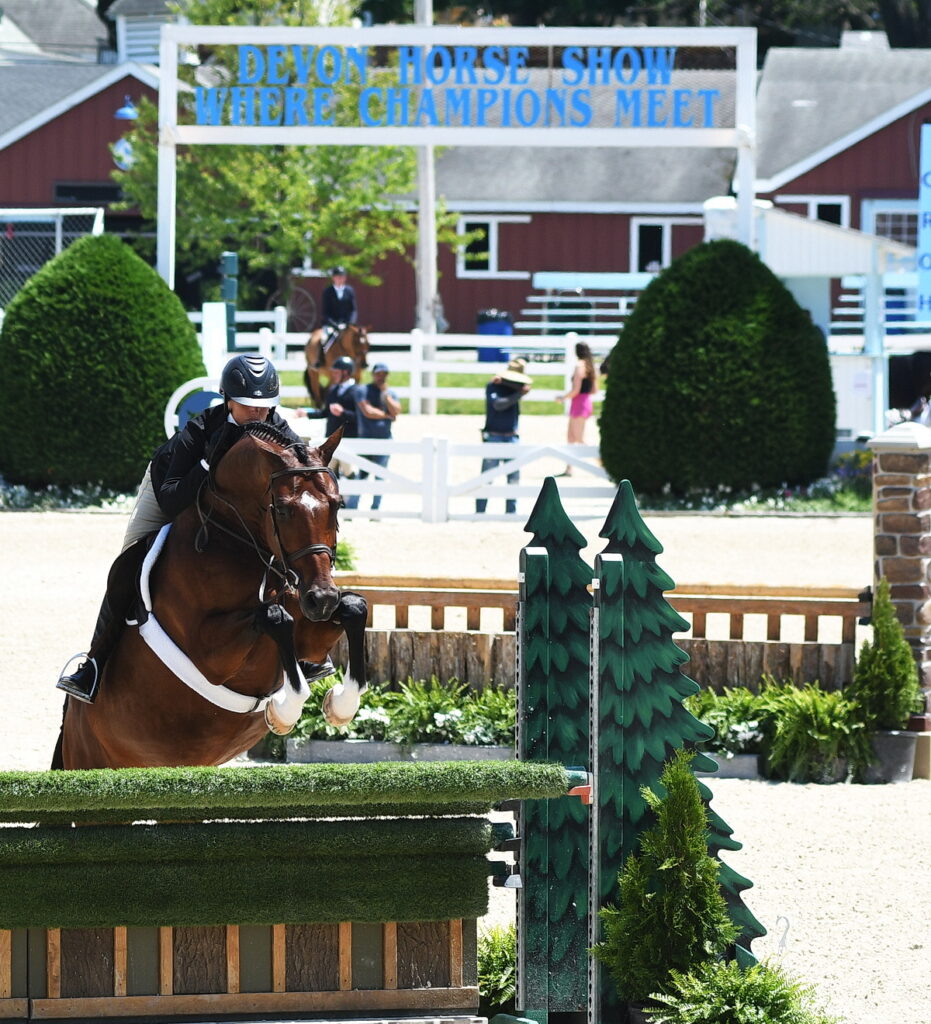
The action under Devon’s iconic sign won’t be changing as new management takes over. (Photo © 2022 by Nancy Jaffer)
“We are going to keep everything that is in position now. We’re going to look at some things and see if we can make some changes a little bit; little tweaks, nothing major. Because it’s kind of set in stone what it is, once we look at it, we’ll see what we do.”
He stressed the importance of “just preserving this great event. We are going to keep everything that is in position now,” he said.
Pat runs numerous competitions under the banner of Illinois-based Showplace Productions. The list of his best-known shows includes the fall indoor circuit’s Pennsylvania National Horse Show in Harrisburg, Pa., where he succeeded Peter Doubleday in 2021, and the U.S. Hunter Jumper Association’s marquee year-end championship in Las Vegas. He also is the technical coordinator for shows at the Desert International Horse Park in California, where Phil is the show manager.
Phil, who lives in Florida, is a course designer and judge, as is Pat. He manages the hunter/jumper portion of the Germantown, Tenn., charity show and the Menlo Charity show in California, among many others.
When discussions about taking over at Devon began, Pat said, “My first reaction was sort of similar to Harrisburg, when I got involved with that. It’s one of the most iconic shows, Harrisburg; so is Devon. They can’t not be successful, they cannot leave (their locations), in my opinion. We have to try to preserve whatever we can preserve going forward. It’s so important to me.”
His attachment is more than just professional. His daughter, Caitlin, won Devon’s 2014 R.W. Mutch Equitation Championship on “one of the best weekends of my life. It holds a near and dear special place for me on a personal level,” Pat explained.
He noted that “Peter and David have obviously done incredible things. I respect them both to the 10th degree. As far as what can we do different, it’s so new right now I haven’t even gotten that far. I’m honored to be thought of to keep that thing going.”
He added, “Phil and I are a good team.” They will look at schedules and plans and “what can we do new and different.”
“I always like to try to do a little something different—we did a big new facelift and a big new everything at Harrisburg. Devon’s a little more traditional with all the blue and everything like that.”
While that won’t be changing, he mentioned he’s known for ring décor “and how everything looks and just that aspect of it I’ll probably bring a little bit of my flavor to the event.”
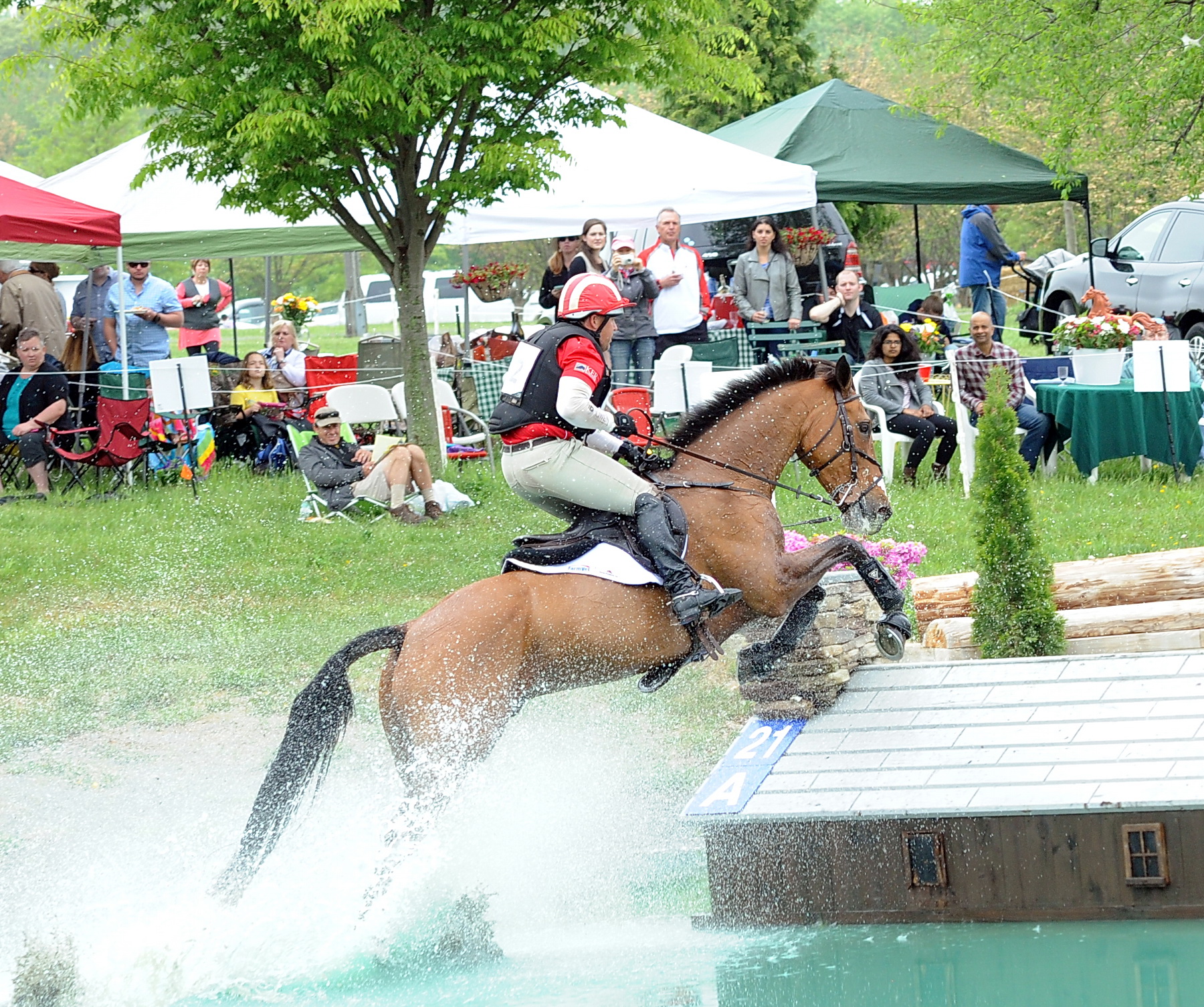
by Nancy Jaffer | May 20, 2022
You may regard the Horse Park of New Jersey as a place for competition, but it is also a place that is in competition–with state horse parks elsewhere that have similar missions.
They are located in Georgia, Virginia, Kentucky and Florida (and don’t forget the refurbished Fair Hill, Md., site that hosts the country’s new 5-star event). Private facilities in North and South Carolina and New York also are among venues that are looking to attract exhibitors, and huge expenditures at Wellington International and the World Equestrian Center in Ocala, Fla., have raised the bar even more.
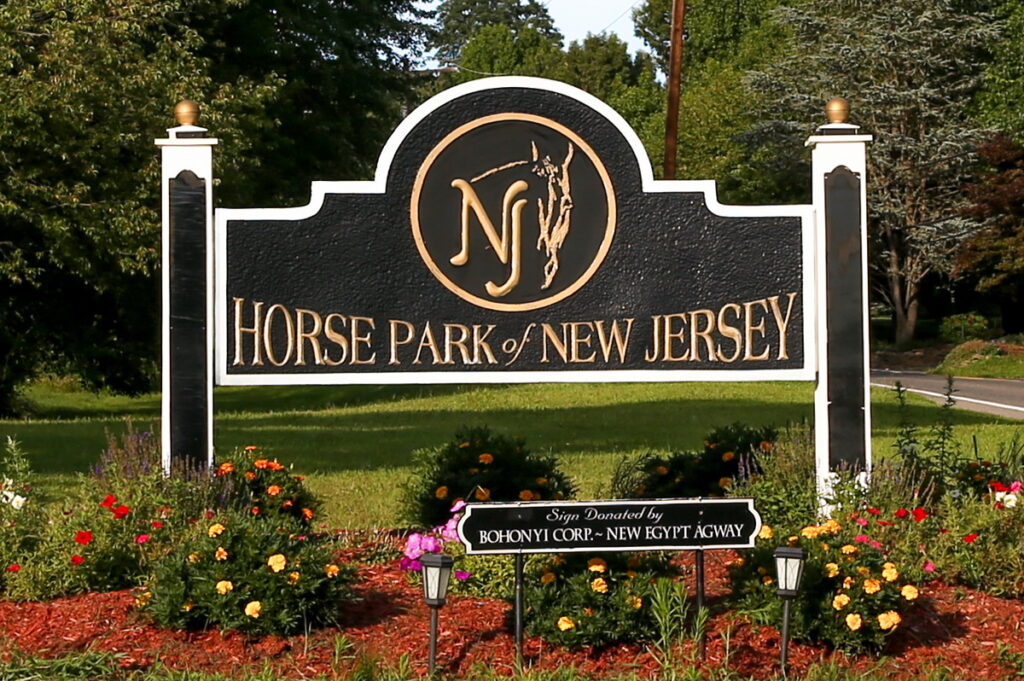
One thing all these places have in common is up-to-date footing and stabling, while the New Jersey park in Monmouth County is working with footing in its rings that is not to the modern standard, and stalls from another era. The parks in other states “show off their state. New Jersey’s state animal is the horse, and our horse park is usable, but it’s sure nothing to show off,” said board member Marilyn Payne.
In its 35 years, the horse park has fallen farther behind because it hasn’t had the infusion of cash it needs to modernize.
“It’s a crisis for long term use and competition with other venues,” said Marilyn, a well-known trainer who has competed at the park as has her son, Doug, the highest-placed rider on the U.S. Olympic eventing team in Tokyo last year, and her daughter, Holly Payne Caravella, also a professional horsewoman.
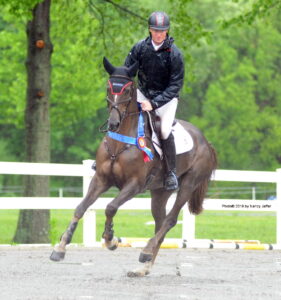
Doug Payne taking a victory gallop in the grand prix ring at the Horse Park of New Jersey when he won at Jersey Fresh. (Photo © by Nancy Jaffer)
Marilyn cited the effort that went into the venue’s premier feature, the Jersey Fresh International Three-Day Event for two decades, but “we lost it because other horse parks had far better (arena) footing and stabling,” she contended.
Complaints about those two items have kept some equestrians living in other states from coming to the park, while they also have been responsible for a number of New Jersey horse owners’ decision to show elsewhere, even though the footing on the cross-country course is ideal.
The situation is particularly painful with rising gas and diesel prices, since it is more cost-effective and convenient for New Jersey equestrians to show in-state rather than driving for hours to ride under better conditions in other states. She notes that other facilities offer “destination events,” explaining “that’s something you want to be able to qualify for and get there because it’s such a fabulous venue.”
But now there is an opportunity for improvements at the park, and New Jersey residents can make them happen by contacting their state legislators and urging them to vote for Assembly Bill 3982, a fiscal year supplemental appropriation introduced by Assemblyman Ronald Dancer of Cream Ridge (R-12th Dist.)
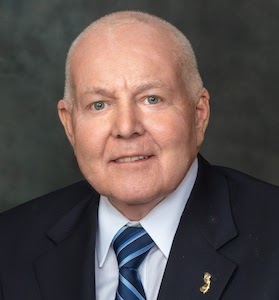
Assemblyman Ron Dancer.
The bill calls for a $2.5 million allocation for footing for three arenas and two warm-up rings, with stabling improvement if any money is left over. The assemblyman noted the time is right to seek funding from the state because it has “unprecedented surplus levels,” as tax revenues increased $13.4 billion in two years, more than 35 percent higher than what was collected in 2020, according to nj.com.
The assemblyman had asked for a wish list of improvements the horse park board wanted to see, and it came to a total of $8.5 million.
“From that. he came up with that proposal of $2.5 million,” said park board vice president Ellen Clark, noting he felt that was the park’s best shot for its most-needed improvements.
Stabling is an issue because at the time the park was developed, horses generally were smaller than they tend to be today, she said. It’s important that the horses have enough space, and in the interests of disease prevention also can’t touch noses with other horses while in their stalls.
However, Dancer knows more needs to be done. He wants to see work begin on drafting a five-year capital plan for further improvements at the park after the end of this fiscal year on June 30.
Footing First is the company that would supply SRS footing. The firm said the footing, which includes silica sand,
“provides excellent traction, cushion and durability.”
Silica sand, according to the company, creates a surface with longevity and is a “blend has proven itself to be an excellent choice for all disciplines.” That’s important at a facility used for everything from dressage, show jumping, driving and eventing to saddlebreds and western.
“We felt this is the best solution for the park and our needs, to serve all our constituents,” said Ellen.
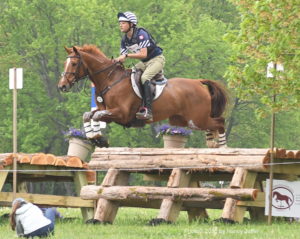
Big names such as Boyd Martin were a fixture at Jersey Fresh. (Photo © by Nancy Jaffer)
The assemblyman, the son of legendary harness horse driver and trainer Stanley Dancer, was behind a bill that sought to eliminate the tax on horse board in 2020. Although that made it all the way to the governor’s desk, he didn’t sign it. The legislator is hoping for better luck this time, but first the bill has to get out of committee.
He advises the way to do that is for everyone who would like the Horse Park to be improved to write to the legislators in their own district, or even call their offices. This is a proactive step that should be taken by anyone who wants to see the park live up to its potential.
They should also contact Assembly Speaker Craig Coughlin (District 19) and Senate President Nick Scutari (District 22). Click on this link to find the names and addresses of your legislators; all you have to do is fill in the name of the town where you live. And a note or call to Gov. Phil Murphy also will be beneficial. Contact him via email with this link. Here is a link that will enable you to read the details of the bill. A sample letter you can send is on the Horse Park website at www.horseparkofnewjersey.com; or click here
“We’ve never had funding available to address the needs of the Horse Park. The horse is the state animal, and we need to make a statement we are supporting our state horse park financially,” the assemblyman said, noting he is unaware of any direct state appropriation for the park during its history, aside from supplying the land where it is located.
“When you have a state horse park that is drawing from other states and regions, we want to be proud of what we have in New Jersey. Number one, we want to make sure everything is safe. The emphasis here is on safety and recognizing that the state of New Jersey has a fiduciary responsibility to address the needs of a state horse park,” he added, commenting, “I think it’s overdue.”
Because of the park’s name, people think it is funded by the state, which doesn’t provide an incentive to give money to the facility. The park is actually a non-profit that has to pay for itself. Ellen noted there has been talk about rebranding–perhaps with a named sponsor–but that’s only a thought at the moment.
“We try not to raise the rates at the park so much that people can’t afford to use it,” Ellen commented. She noted the park is still seeking other grants, through “every possible avenue.”
by Nancy Jaffer | Jun 23, 2022
The U.S. is neck and neck with the Netherlands’ home team in the dressage Nations Cup at the Rotterdam Horse Show after today’s Grand Prix. They are tied on a score of 19 points each, with Sweden third on 29. Seven nations are competing, with the championship to be decided on Saturday after the Special and Freestyle.
Dutch rider Dinja van Liere leads the way individually on Hermes (79.739), while Patrick Kittel of Sweden stands second with Blue Horse Zepter (76.130 percent). The top U.S. rider was Ashley Holzer of Wellington, Fla., with Valentine (72.957). Alice Tarjan of Oldwick, N.J. was seventh in the field of 28 with the U.S.-bred Serenade MF (71.239) in the mare’s first European competition.
There were two other U.S. riders competing. Katie Duerrhammer on Paxton (70.456) finished 11th while Ben Ebeling on Illuster van de Kampert ended up 28th and last with a score of 57.152 after getting marks of 1 in the piaffe on two occasions in the test.
The Americans have been shortlisted for the team that will go toAugust’s world championships in Denmark, for which Rotterdam is an observation event. Other short-listed riders are slated to compete at Aachen next month.

by Nancy Jaffer | Jun 15, 2022
We get used to seeing U.S. show jumping teams on the podium, as they were in this 2020 competition. Nations Cup qualifier in Florida.

The U.S. team was victorious in a Nations Cup qualifier for Barcelona in 2020. (Photo © 2020 by Nancy Jaffer)
But for the first time, the U.S. show jumping squad hasn’t qualified for this fall’s Nations Cup Final in Barcelona..
What happened? Read the story I wrote for Horse Sport by clicking on this link
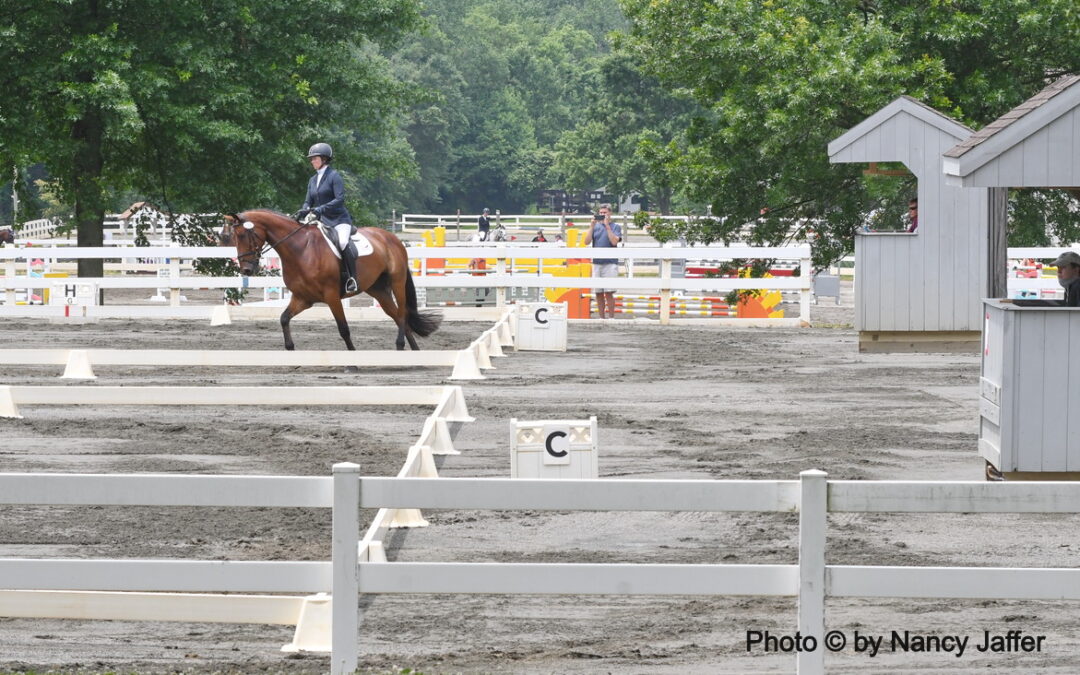
by Nancy Jaffer | Jun 14, 2022
An international dressage show scheduled for the Horse Park of New Jersey has been cancelled due to lack of entries and a complication involving withdrawal of one key official, but the Level 3 national Dressage at the Park show, scheduled in conjunction with the CDI, still will run July 7-10.
Jennifer Bateman, the show organizer, said only three people had entered the 2-star/1-star CDI, which was a qualifier at Intermediate I and Grand Prix (along with Para, Junior, Pony, Children’s and Young Riders) for August’s U.S. Equestrian Federation Dressage Festival of Champions at Lamplight Equestrian Center in Illinois.
At the same time, the veterinary services manager required for the CDI by the FEI (international equestrian federation) had to bow out. Others with the proper qualifications—which are changing as of July 1—were not able to take the job due to a variety of conflicts in their practices or personal lives.

The entrance to the Horse Park.
“I asked for an exception from the FEI; they wouldn’t grant it. We tried everything,” show organizer Jennifer Bateman said.
“We cancelled earlier than optimum for some competitors, but we cancelled at the best time to make sure that all of our sponsors, should they choose to leave and do something else, and our vendors, and our officials all had enough time to get their money back on their air fare and those sorts of things.”
Under the Horse Park contract with officials, “If we cancel in less than a month (before the show) that travel is on the Park. We made the best decision for the financials of the Park, as well as giving all of our officials sponsors, vendors and competitors enough notice of what we were doing. Everything was done in our power within our budget within reason to make it happen. The rest of the competition is going on as planned.”
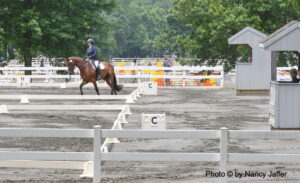
The grand prix arena at the Horse Park. (Photo © by Nancy Jaffer)
She anticipates 150 horses being on the grounds of the Allentown venue each day.
So even though the closing date for entries was not until June 26, the writing was on the wall last week for the CDI, which costs more to run than a national show because of various FEI requirements.
“We decided to cut our losses instead of waiting until the very last minute and not having that (veterinary) official available,” said Jennifer, who was pleased sponsors decided to stick with the show anyway.
Competitors in most divisions hoping to qualify for the Festival can use scores from the national show, but in the I-1 and Grand Prix, they also need a score from a CDI. The only other CDI in North America before the entry closing date for the Festival is Caledon in Ontario, Canada, beginning July 22.
The cancellation was bad news for riders who had been planning to enter the New Jersey CDI and try to qualify for the Festival if they hadn’t done so in 2021 at Dressage at Devon or in Florida during the winter of 2022.
“You set your schedule around certain shows, so it’s obviously disappointing,” said trainer Lauren Chumley of Pittstown, N.J, who learned of the cancellation over the weekend.
A mare she had been trying to qualify for the Small Tour at the Virginia CDI last month was under the weather there, so the Dressage at the Park CDI seemed like her last chance.
She hadn’t entered because of a cash flow situation common to trainers, but was expecting a check in time to pay her entry fee before the original deadline.
“If they wanted everyone to enter early, they should have had changed the closing date and made it sooner,” Lauren contended.
“It’s very frustrating for me, because I don’t get to play in these (CDI) arenas very often.”
Lisa Gorretta, the show’s technical delegate and the former president of the U.S. Dressage Federation, said, “The closing date was a week before the competition. Why? Because competitors insist on not entering until the last minute.
“If you make your closing date too early, they don’t want to commit that early because something could happen to the horse and they won’t get their money back. If you ask any horse show organizer at any level in dressage…if you make it (the deadline) too early, then you have to extend it, which you can’t do for a CDI.”
Now Lauren is debating whether she can afford to pay $6.50 a gallon for diesel to get herself and her horse to the Canadian CDI. Naturally, she would have preferred the 75-minute trip from her barn to the Horse Park.
She wishes that as organizers were worrying about light entries, they would have told potential competitors, “If you’re coming, you need to enter, so we don’t cancel the show.”
Heather Mason, a trainer from Tewksbury, N.J., said she has a client who is hoping to compete at the Festival and now is wondering whether she should chase a potential score to Canada “but I’m not recommending that,” said Heather.
“The USEF can do wild cards,” she noted, wondering if they could be granted to riders for the Festival under these circumstances.
“It’s unfortunate more people didn’t enter early, because I know a good number of people were planning to do the CDI,” she said.
At the same time, Heather added, “The show’s not going to bank everything on three entries. It sounds like the show did not have a choice.”
Lisa Gorretta addressed the situation on Facebook, stating, “the dressage equestrian `village’ and `community’ concept simply must work and go both ways, or you will have but one general location and time of year in which to compete East of the Mississippi.”
In an interview, she explained, “I’m a huge advocate of getting these starter CDIs, not because there’s anything wrong with Florida, but because there are competitors and horses that aren’t ready to go there. I think it is an advantage for the future of the sport to be able to offer competitions throughout the year. The 2-star is an awesome place to do it. I’m a huge advocate of having it happen and therefore it pains me when it doesn’t happen.”
Elisabeth Williams, the retired dressage super steward, who is volunteering at the Horse Park show, suggested a concept that might help competitors and shows alike under similar circumstances. She’s seen it in Sweden at jumper shows run by her sister, where there is a non-refundable commitment fee of $25 or $50 that can be paid early in the entry process, and then a starting fee that could be refunded if necessary.
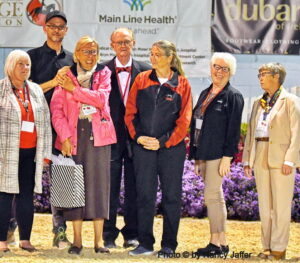
Elisabeth Williams (second from left) is saluted on her retirement during Dressage at Devon by her friends, including Lisa Gorretta on the right. (Photo © by Nancy Jaffer)
She suggested riders need to be more proactive, “you’ve got to let everybody know you’re coming.”
What happened with the Horse Park CDI might prompt a new approach on both sides, she commented.
“Maybe now everybody learned a lesson from this one, and let’s hope that next year they can try it again.”
“We are considering doing it again,” said Horse Park Vice President Ellen Clark.
“I’m asking them to consider different dates,” she added, noting there also has been a thought of putting together a series with Centerline at Saugerties and Dressage at Devon.
“In order to make this a success, we need to do it either when people are on their way down to Florida or on their way back. And then they come.”
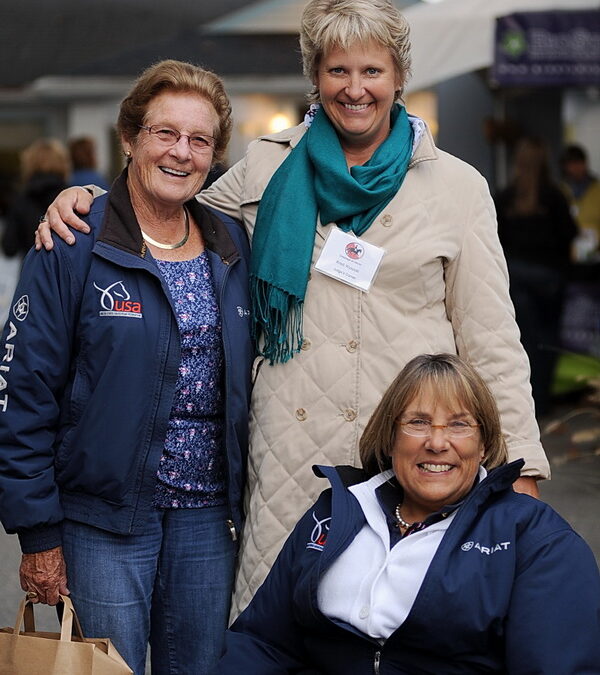
by Nancy Jaffer | Jun 13, 2022
Hope Hand’s devotion to U.S. Para Dressage efforts over the decades paid off in three ground-breaking medals at last summer’s Tokyo Paralympics, part of the long process in which she played a key role as America’s status in the discipline was elevated to global distinction.
Three months after the Paralympics, the president of the U.S. Para Equestrian Association was diagnosed with pancreatic cancer, and on Sunday, June 12, she passed away.
Yet as was typical for Hope, she remained active in her devotion to the discipline until three weeks before her death, according to Laureen Johnson director of Para Equestrian for the U.S. Equestrian Federation.
“The Para Dressage community world-wide has lost a legend and a true friend,” said Laureen.
“Hope not only knew every U.S. Para Dressage athlete, from emerging to elite, but also recruited many of them into the program.”
From a wheelchair on the ground, Hope rose to independence in the saddle. Starting as an active competitor, Hope was the first alternate for the U.S. squad at the 1996 Paralympics, when equestrian competition made its debut in those games.
She competed at the British Invitational in 1997, earning gold, silver, and bronze medals. In 1998, she was one of four disabled riders riding on teams with their able-bodied peers at the USEF Festival of Champions. Her freestyle score broke a tie, earning her team the Bradshaw Challenge Cup.
The following year, as a member of Team USA at the 1999 World Dressage Championships, she won a bronze medal. Hope also competed at the 2000 Paralympics in Sydney, Australia, finishing fifth in the overall standings.
Rebecca Hart, a member of the bronze medal team in Tokyo, called Hope “the consummate horsewoman and advocate for Para Equestrian. I did this my entire career the past quarter of a century with Hope, either as a competitor or as advocate or as liaison among USEF, USPA and the FEI. She helped nurture the grassroots program in the U.S.”
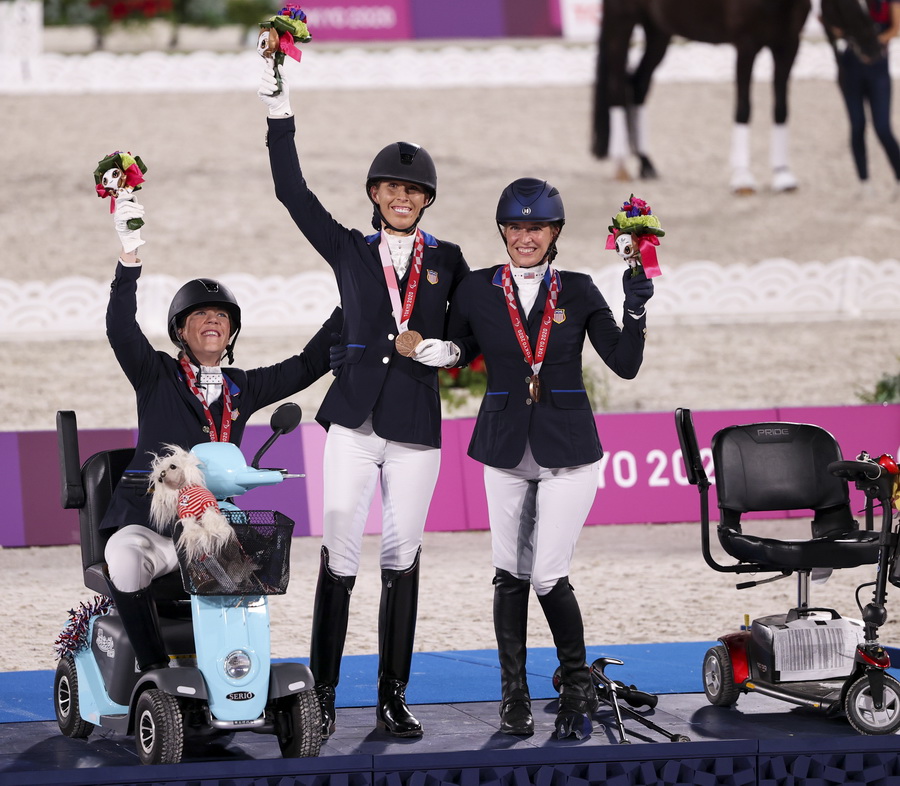
The USA’s first paralympics medal team; Roxie Trunnell, Kate Shoemaker and Becca Hart earned bronze, realizing a dream of Hope Hand’s.
She recalled that when the U.S. wasn’t qualified for the 2012 Paralympics and needed one more score as the deadline loomed, Hope got four riders on a plane to Australia, scene of the last qualifier, put them on borrowed horses and watched as they were able to make the cut for London.
“We got it done; it was with Hope’s push and drive and dedication, we were able to do that.”
“I think almost every para rider competing on the circuit had some interaction with Hope Hand,” observed Becca.
“To lose someone with that much driving force is very difficult. The best thing we can do is keep the momentum that we have in our sport from all the success that we’ve gotten to experience in the last several years and carry that forward, and keep her drive and her passion moving.”
Laureen noted, “Hope was available 24/7 to everyone to advise, encourage and educate them on their journey to be the very best version of themselves, professionally and personally.
“I have lost a great mentor and friend. She is truly irreplaceable, with her extraordinary energy and warm, caring heart. Her beautiful smile, witty personality and laugh will always remain in my heart and mind.”
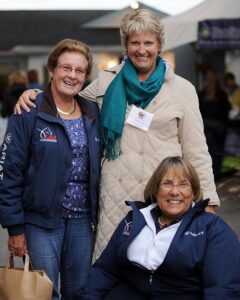
Hope Hand (seated) with Jessica Ransehousen and Krysti Wysocki. (Photo © by Nancy Jaffer)
Hope was the recipient of numerous honors for her leadership in promoting sport for athletes with disabilities. She was chosen by her community to receive the “Home Town Hero” award for her work in developing programs and opportunities for young equestrians in her home state of Pennsylvania. She was president of the Reins of Life therapeutic riding program in southern Chester County, Pa., and president of the recognized national affiliate of the USEF, the U.S. Para-Equestrian Association. She served on the USEF board and had chaired the USEF High Performance Committee.
Hope is survived by her husband, Stanley and their daughter, Amy (Eric Capozzoli. A memorial service will be held later in the year, probably in the autumn.
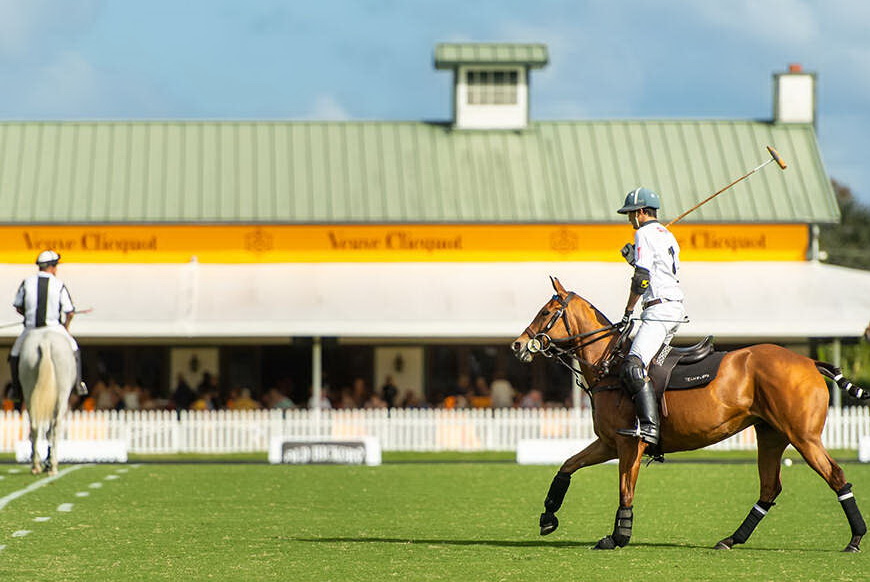
by Nancy Jaffer | Jun 9, 2022
The United States Polo Association has purchased the core assets of the International Polo Club Palm Beach in Wellington, Fla., including 161 acres comprised of Fields 1 through 5, the grandstand, the pavilion, the Mallet Grille, the Seventh Chukker, the USPA Clubhouse shop, the Outback Field, the Outback facility, and the IPC social club and its facilities, including a swimming pool, gym, and tennis courts.
The IPC property will be called The USPA National Polo Center-Wellington, realizing the vision of a USPA-owned “Sunday Field” that will serve as the permanent center of polo in America and set the standard for excellence in polo. That vision was first articulated by USPA Chairman Stewart Armstrong in an essay called The Sunday Field that appeared in the Spring 2020 issue of Hurlingham Polo Magazine.

The polo field at IPC. (Photo ©White Fence Photography Company)
Mark Bellissimo, managing partner of Wellington Equestrian Partners, the former owner of the facility, and Wellington’s largest private landowner, said, “The sale of IPC to the USPA is part of our ‘Wellington 3.0’ strategy which is focused on strengthening both the equestrian venues and the core lifestyle elements that are critical for Wellington’s long-term success.
“We chose the USPA over competing offers and real estate development strategies to ensure that this fundamental pillar of the Wellington equestrian domain will be here for the next 100 years. I was inspired by Stewart Armstrong’s vision and believe the USPA has the commitment and resources to take this venue and the sport of polo to the next level which is a win for all involved.”
Originally, there was talk that WEP intended that IPC would host a new dressage facility, but that never came to fruition. Previously, WEP sold the Palm Beach International Equestrian Center to a group headed by dressage competitor and horse dealer Andreas Helgstrand of Denmark. This spring, the home of the Winter Equestrian Festival was renamed Wellington International. Andreas is also looking to buy the Global Equestrian Center, a dressage venue and show jumping site down the street from the facility where WEF is held.
The USPA will continue to host the Gauntlet of Polo® at its property, but it will also use the facility to support polo played at the medium- and low-goal levels. The USPA intends to keep substantially all the current IPC staff in place. Tim Gannon, co-founder of Outback Steakhouse and three-time winner of the U.S. Open Polo Championship®, will serve as Chairman of the Board of a newly-formed USPA subsidiary created to revitalize the social club and hospitality facilities.
With its ownership of the National Polo Center, the USPA has secured a perpetual home for polo in America. The facility will enable the USPA to showcase its tournaments, develop American players, and sustain an environment that will retain and attract new players and sponsors at every level. It will also secure the future of winter and spring polo in South Florida, which many of the sport’s key participants from throughout the country rely on as a major source of the annual income that allows them to participate in polo at their summer and fall club locations.
The USPA plans to open the annual Wellington polo season beginning with the Federation of International Polo World Championship, from October 26 through November 6.
“The investment in a high-profile Sunday Field will enable the sport and brand to control our destiny for future generations,” said J. Michael Prince, President and CEO of USPA Global Licensing, which manages the global, multi-billion-dollar U.S. Polo Association brand.
“With a global footprint across 190 countries, we view the Sunday Field as a unique opportunity to highlight U.S. Polo Assn.’s authentic connection to the sport and build additional global brand awareness. Additionally, this opportunity will create an epicenter of polo to promote not only high-goal events such as the Gauntlet of Polo®, but also other best-in-class opportunities at all levels supporting key polo competitions and demographics, such as international, low-goal, medium-goal, women’s, intercollegiate, interscholastic, youth and many others.”
Wellington Village Manager Jim Barnes said the village welcomes the USPA’s purchase of the former IPC facility and the establishment of the National Polo Center, which will ensure polo’s permanent and important presence in the village for the mutual benefit of the polo community and village residents.”
Tim Gannon, co-founder of Outback Steakhouse and three-time winner of the U.S. Open Polo Championship, will serve as chairman of the board of a newly formed USPA subsidiary created to revitalize the social club and hospitality facilities.
Until recentlhy, Wellington Equestrian Partners owned more than 1,000 acres in Wellington and has been the key driver of Wellington’s emergence as the premiere equestrian lifestyle destination in the world. WEP owned both the venues and the operating companies of the three primary pillars of the Wellington Equestrian scene: show jumping, dressage, and polo, which represented over 90 percent of the Wellington equestrian economy.
Wellington’s equestrian festivals host more than 10,000 participants and 250,000 spectators from 50 states and 43 countries. Its events contribute close to $200 million of annual economic impact for Palm Beach County.
by Nancy Jaffer | Jun 8, 2022
The Brandywine Horse Shows scheduled for June 29 through July 10 at the Devon, Pa., showgrounds have been cancelled due to low entries.
“While the Executive Committee considered many options, our best course forward is to take a year off, regroup, and return even bigger and better in 2023,” the show stated in a posting.
Refunds will be issued as quickly as possible. Deposit checks sent were not cashed and will instead be destroyed. Those who want their checks mailed back to them should contact Cindy Bozan at brandywinehorseshows@gmail.com.



























